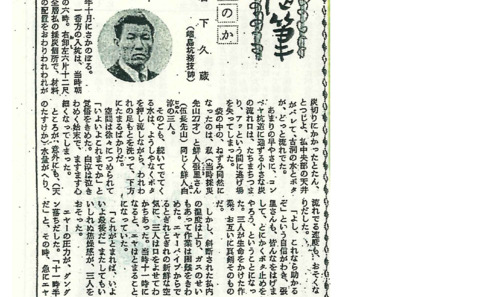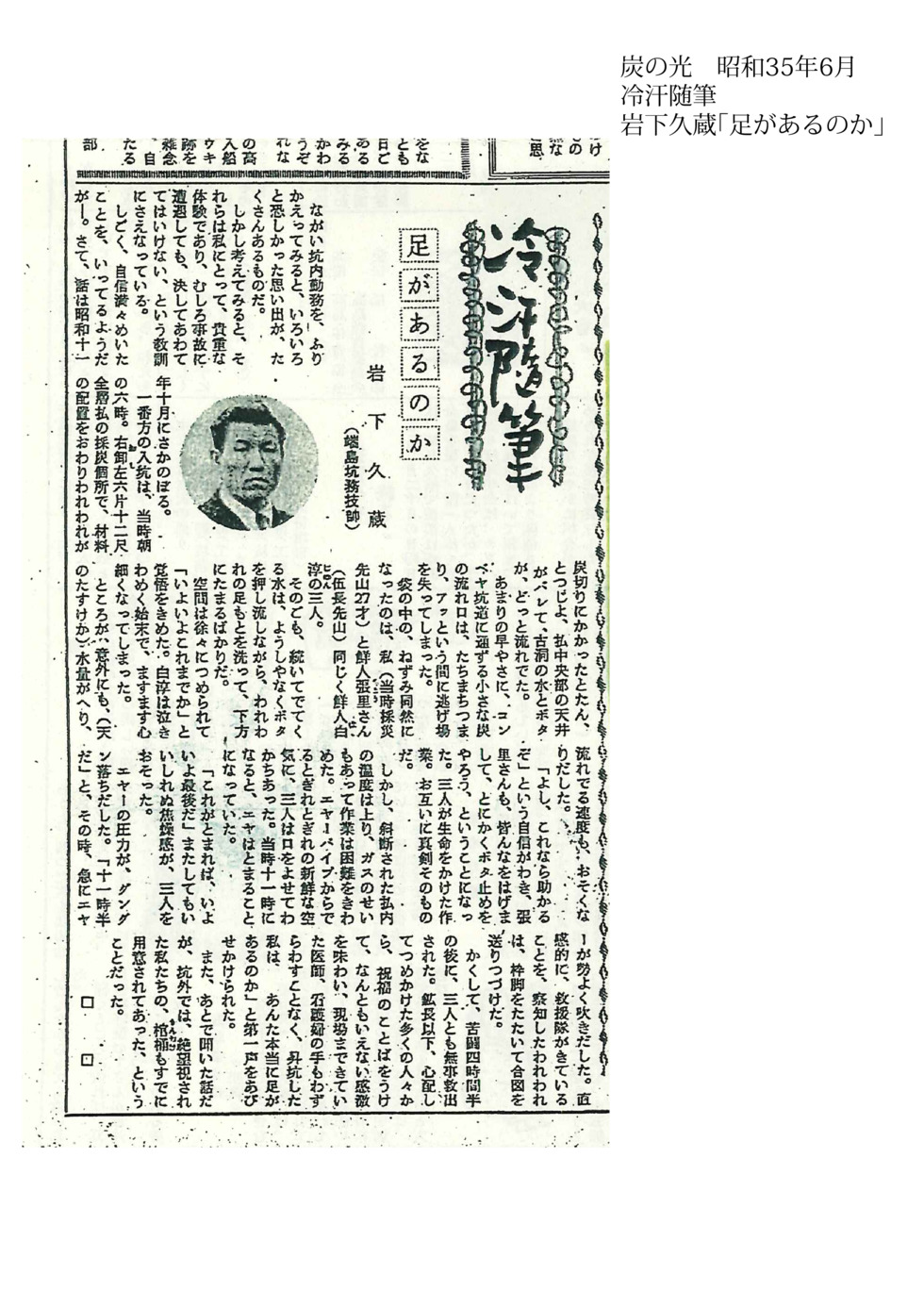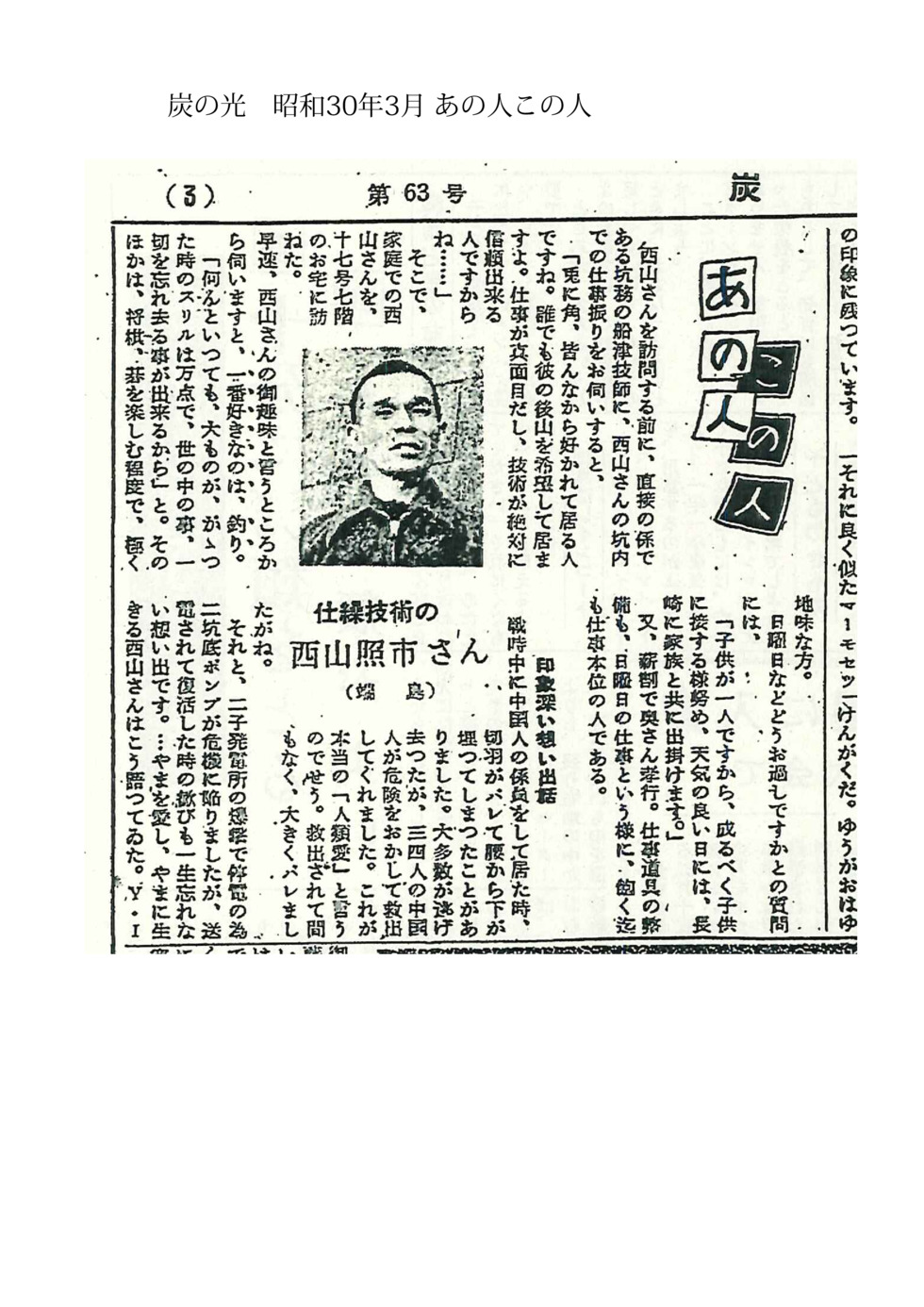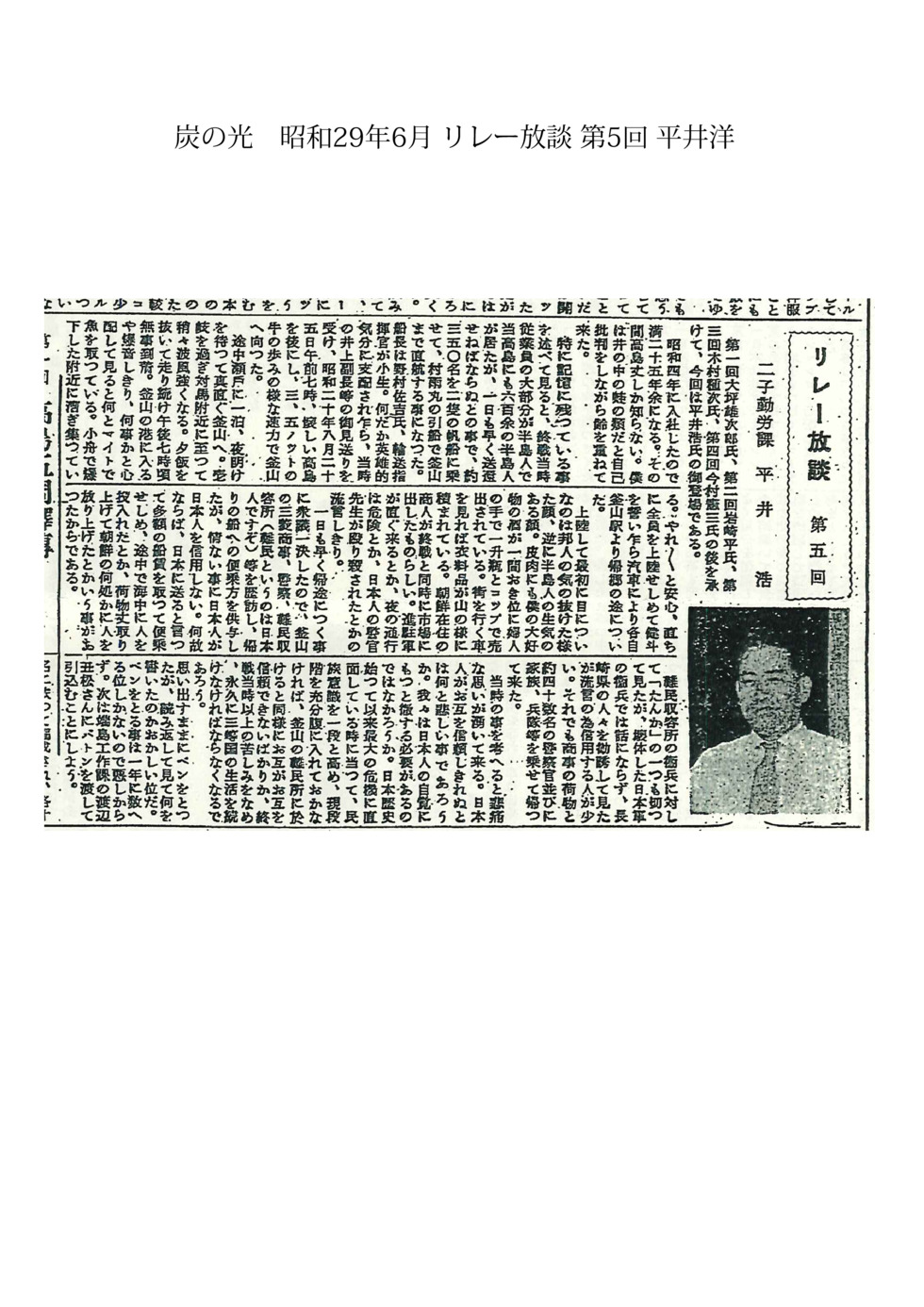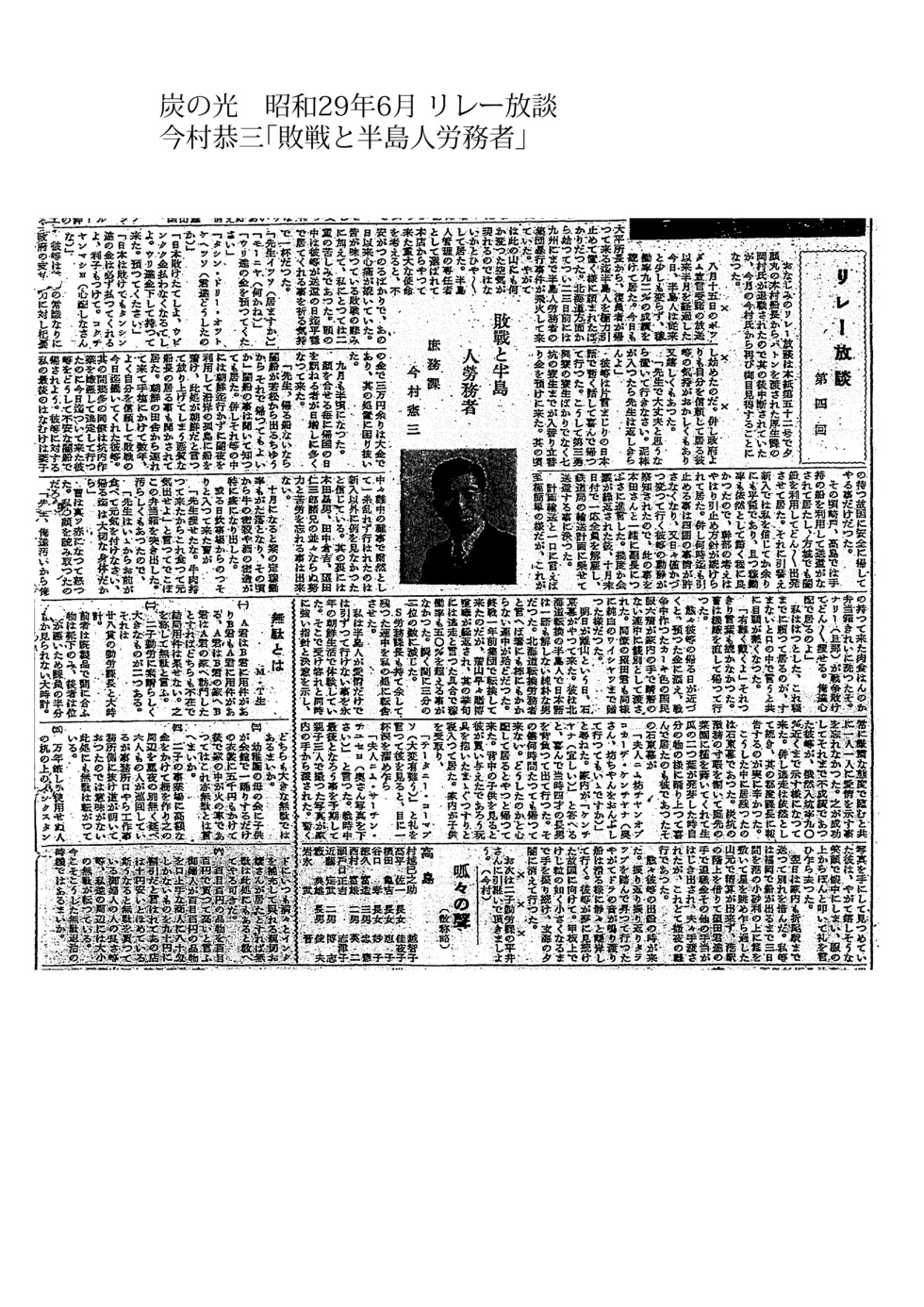Sumi no Hikari (The Light of Coal)
- Author
Page 1
Page 2
Page 3
Page 4
Sumi no Hikari (The Light of Coal)
March 1955
Ano Hito, Kono Hito (Employee Spotlight)
Teraichi Nishiyama
mine shaft repair technician (Hashima)
Before I went to visit Teraichi Nishiyama, I went to talk to his immediate superior, Mr. Funatsu, to ask about Nishiyama’s standard of work in the mine.
“Everybody likes him, and they all want to go into the mine after him because they trust him. That’s because he works hard and his repair and reinforcement techniques are extremely reliable....” said Funatsu.
I then went to visit Nishiyama himself in his home on the 7th floor of the 17th apartment block.
I started by asking him about his hobbies, and he told me that he loved fishing best.
“There’s nothing better than the thrill of hooking a huge fish on your line, because you can forget about everything else that is going on in the world,” he replied.
Aside from fishing, Nishiyama sometimes likes playing shogi and go board games. He is a man of simple tastes.
When I asked what he liked to do on Sundays, he replied: “I only have one child, so I try to spend time interacting with my child. When the weather is good, we go to Nagasaki as a family.”
Otherwise, he spends his Sundays cutting wood for his wife or getting his work tools ready for the next week. He is very much a work-focused man.
Lasting memories
When Nishiyama was managing Chinese workers during the war, he was in an accident where a coal seam caved in and he was buried up to his waist in rubble. Most of the people rushed to escape, but a few Chinese workers braved the danger and rescued him. At that moment, Nishiyama felt he understood the concept of true universal love. Just moments after he was rescued, the whole ceiling caved in.
On a different occasion, there was a crisis with the pump at the bottom of the second mine after the bombing of the Futago power plant caused a power outage. Nishiyama, a man who loves and lives for the mine, says he will never forget the joy he felt when the power came back on and the pump started working again.
Sumi no Hikari (The Light of Coal)
June 1960
“Essays to make your heart race”
Kyuzo Iwashita
Are you a ghost?
Are you a ghost?
Kyuzo Iwashita, a mining engineer on Hashima
When I think back to my long years working in mining, I have many frightening memories.
However, if you think about it, they were all precious experiences for me. They taught me never to panic even during a major accident.
I sound extremely confident, but was I in real life? My story takes us back to October 1936.
Back then, the first shift of workers entered the mine at 6 a.m.. We had just finished setting out the materials and started cutting coal at the coal digging site with a 3.6-meter tall coal seam on the left wall, when, all of a sudden, a crack formed in the central ceiling of the mine, and coal waste and water from an old hole started to pour out.
It came out so fast that the small hole where the coal conveyer belt passed through quickly got clogged up, and very soon, we found ourselves with no way of escape.
There were three of us trapped like mice in a bag; Me (then a 27-year-old mining supervisor), a Korean called Chori, who was a corporal coal miner, and another Korean called Hakujun.
The water and coal waste kept gushing mercilessly out of the crack, cascading over our feet and collecting down below.
As the space around us got smaller and smaller, I decided that “this really was the end.” Our hearts sunk even further when Hakujun started wailing.
But just then, completely out of the blue (or maybe it was an act of God), the water started to recede and the pace of the water pouring through the crack above started to slow.
“Yeah, we are saved,” I said to myself, feeling more confident. Chori, too tried to encourage us. We decided that we should try and plug up the hole to stop coal waste coming in. So that is what we did. It was a task that would determine between life and death. We focused on what we were doing with every fiber of our beings.
However, it was really hard to work owing to the gas and the rising temperature in the enclosed mine. We put our mouths to the air pipe and shared the little fresh air that was coming out. Back then, the air was always cut off at 11a.m.
“When that stops, we are finished.” The three of us felt a sense of sheer panic.
The air pressure started to gradually weaken. “It’s 11:30,” we said. But just then, the pipe started to blow out gusts of fresh air. We recognized this as a sign that a rescue team was on its way, so we started to bang on the mine’s wooden frame to let them know where we were.
After four and a half hours of struggle, all three of us were rescued. Many people, including the mine manager, had gathered near the entrance out of concern for us. They greeted us with words of joy. I was moved beyond words, As I climbed out of the mine on my own steam, without any help from the gathered doctors and nurses, the first thing anyone said to me was, “Are you a ghost?”
I didn’t hear about this until later, but, apparently, those outside the mine had lost all hope of bringing us out alive and had already prepared our coffins.
Free Chat Relay – Round 4
Japan’s War Defeat and Korean Workers
Kenzo Iwamura, General Affairs Division
The popular Free Chat Relay that last appeared in the 52nd edition of this magazine experienced a hiatus following the retirement of the next intended participant, Mr. Okamura, from the Welfare Division. However, the Relay resumes in this current month’s issue with Mr. Kenzo Iwamura.
Half a month after the broadcast of the acceptance of the Potsdam Declaration on August 15, 1945, nothing at all had changed with the Koreans working in the mine, and we were still achieving 92% utilization rates. The mine director, Mr. Ohira, had only just asked me that very day to keep the Korean workers back until Japanese veterans returned from the war if at all possible. Group Riots among Korean workers had broken out in Hokkaido in the North and spread down the country to Kyushu in the south just a few days previously. I was scared that the mood would start to change in our own mine. As the person selected to come down from the head office to be responsible for the Korean workers, I felt a heavy duty to ensure everything went smoothly. I became increasingly anxious and worried from that day. Everyone was suffering from the defeat in the war, but I was suffering a double load. My head was filled with the desire to ensure that everyone remained calm until the day came to send them home.
“Sir, are you there?”
“What is it?”
“Will you look after our money for us?”
“Why, what’s the matter?”
“Japan has been defeated so payment by the authorities may be suspended. We have drawn our money out and brought it here. Will you look after it for us?”
“Even if Japan has been defeated, the authorities will definitely still pay you, and with interest. Don’t worry about it.”
Based on their own reasoning, they had started to worry about the government’s ability to pay them. I found their faith in me over the government both strange and touching.
“If you feel comfortable leaving it with me, then you can. But I won’t be able to give it back if a burglar gets in.”
They stayed behind, speaking in broken Japanese interspersed with Korean words for a while, and then left. After that, it wasn’t just residents of the 3rd dormitory who came to me to deposit their money, but residents of the 7th dormitory as well. I ended up with more than 30,000 yen, which was a large sum of money at that time. I hardly knew what to do with it.
Before we knew it, it was the middle of September.
More and more of the workers started asking me when they would be going home whenever I saw them.
Some Koreans came to me and asked, “Sir, if there is no ship to take us home, people say there are pirate ships leaving from Wakamatsu, so can I go home on one of those?” I had heard there were pirate ships around, but I had also heard that there were some bad captains who wouldn’t go all the way to Korea and would instead take advantage of the dark nights to stop off at a nearby isolated island, say it was Korea and put the people off. These people had been brought from rural Korea to work diligently for several years. They had trusted me and worked well up until the day of Japan’s defeat. There were some among them who hated the mine work and had escaped, but how could I send those who had followed me right up until this day on an unstable pirate ship. The only true final parting gift that I could give them was to return them safely and securely to their families in their home country.
Around that time, Korean workers were being sent home from Sakito and Takashima on any boats on hand, and some were being sent home from Hojo in pirate vessels as well. In stark contrast, the workers at Shinnyu Coal Mine were unusually calm, maybe owing to their faith in me, and the mine utilization rate continued to be high, so the management policy was to keep them working there. However, given the changing surrounding circumstances, it was impossible to keep the workers on indefinitely, and we had started to observe slight changes in their behavior, so Mr. Honda and I determined to explain all of this to the deputy manager together. After several meetings, it was decided that all workers would be dismissed on the last day of October, and we would make use of the railway office transport plan to return everyone to Korea.
Planned transport may seem like something simple when you hear it, but actually, it involved every conceivable difficulty imaginable. I believe Shinnyu Coal Mine was the only place where the operation went off without a hitch. We should never forget the extreme efforts and tribulations suffered by Masao Honda, Kurakichi Tanaka and Nisaburo Mochida behind the scenes to make it work.
As expected, the mine’s utilization rate plummeted once into October, and the workers were suddenly more interested in the secret butchery of cattle and the illicit distilling of sake rice wine.
One day a Korean man came in slowly from the kitchen.
“Sir, you have gotten thin. I’ve bought some beef for you so eat it and get well,” he said as he extended me a battered lunch box. It was dirty, so I said,
“I’m fine so you eat it and get strong. You have to look after yourself until you go home.”
The Korean man went red in the face and was very angry. He had read my expression well.
“Sir, we are dirty, but won’t you eat my meat? I washed the lunch box well before putting it in. You have grown very thin since losing the war. We are worried about you.”
I was so surprised when I realized how much they relied on me. I had tears in my eyes as I apologized.
“I will eat it gladly” was all I could manage to say, but he left happy.
As the day for the Koreans’ departure grew near, I gave them back their money, and my wife gave six sets of khaki clothes made during the war to the men without any clothes as a farewell gift. Apparently, my colleague, Mr. Awada also gave them some bright white shirts.
On the day before they were due to leave the mine, Seki Tomaku came to see me. He was a Korean who had been transferred from Hokkaido. He was a simple man who didn’t speak a word of Japanese. Nearly all the workers who had transferred from Hokkaido were invariably of little use. Almost as soon as they arrived as a group roughly one year before the end of the war, they started constantly having fights. After a while many of them escaped from the mine, and utilization rates at the mines where they worked rarely exceeded 50%. Before long, their numbers had fallen to two-thirds their original.
The Mr. S, head of labor section, decided he had enough of them and sent his remaining Koreans from Hokkaido to me.
I already knew from the days I spent in Korea that you can’t manage Koreans with affection alone. When I accepted them, I showed them strong guidance and determination. I was always serious with them, but I never forgot to show them affection as well. Thanks to this successful approach, Koreans who had performed badly in the past suddenly started achieving 90% utilization rates. However, some continued to escape, and it pained me to have to report this to my section chief.
Seki Tomaku was one of the Koreans from this group who stayed. In his rare moments away from the harsh work in the mine, he would plant seeds in our family garden. It was Seki Tomaku who danced with joy when two-leaved gourd shoots started to sprout out of the ground as if they were his own. One day, he asked my wife,
“Can I take the baby for a walk on my back?”
When my wife replied, “Yes, that OK,” he smiled and put our four-year old son on his back and went out. He didn’t come back for several hours. We were worried about what had happened to them, but then he came back. When I looked at our son on his back, he was fast asleep, clutching a toy that Seki must have bought for him. When my wife took the child and thanked him, he had tears in his eyes.
“Can you give me a photo?” he asked.
My wife passed him the photo that we had taken of the three of us when we thought we wouldn’t survive the end of the war. He looked at the photo in his hand for a while, smiled broadly, put it in his pocket and patted it fondly before thanking us and leaving.
The next day, I accompanied my wife to Orio station to say goodbye. We then spent three days sleeping under the stars on a rug on the pebbles near the Fukuoka harbor waiting for our boat to leave. We weren’t able to settle the finances at the mine, so we rented spaced above the harbor station so that Mr. Awada and his team could calculate and distribute the severance pay and other benefits owing to the workers. They worked through the night to make sure it was all completed properly.
The time came for the Koreans to leave. They looked back time and time again as they went up the ramp to board the ship. Soon, the ship sounded its departure and slid gracefully away from the shore. Those aboard were headed for the homeland of their dreams. We kept waving to them until they were as small as poppy seeds on the deck disappearing into the dusk on the Genkai sea.
And now it is time for me to pass the baton to Mr. Hirai of the Futago Labor Section (Kenzo Imamura)
Free Chat Relay – Round 5
Hiroshi Hirai, Futago Labor Section
We are proud to present the next round of the Free Chat Relay. Round 1 featured Yujiro Otsubo, Round 2: Taira Iwasaki, Round 3: Tanetsugu Kimura, Round 4: Kenzo Imamura, and now we welcome Hiroshi Hirai for Round 5.
I entered the company in 1929. That was over 25 years ago. During that time, Takashima was all I ever knew. All my life, I have reproached myself for being like a frog in a well who’s never seen the wide world.
The thing that sticks most in my memory is that, at the end of the war, the majority of the workers were Koreans. There were over 600 Koreans at the Takashima mine. We felt that we had to send them home as soon as possible, so we decided to put approximately 350 workers in two sailing ships and use the Murasamemaru towing boat to tug them directly to Busan in Korea. Sakichi Nomura served as the captain, and I was the transport manager. I felt like a hero charged with a precious cargo as Mr. Inoue, the deputy manager of the mine at the time, waved us off at 7 a.m. on August 25, 1945. We left our beloved island Takashima behind and started traveling at the snail’s pace of 3 to 5 knots towards Busan.
We stopped for a night at Seto and then set off at dawn to head straight for Busan. We hit strong wind and waves once we passed Iki island and drew close to Tsushima. We skipped dinner and kept on going, reaching Busan safely at about 7 p.m. in the evening. The moment we arrived in the port at Busan, we heard lots of explosions. I was really worried about what was happening, but when I looked more closely, I realized that they were using dynamite for fishing, and people were rowing small boats near the explosion site to haul in the fish. I felt relieved when I realized nothing dangerous was going on. We let everyone off the ship swiftly. After wishing good luck and wellbeing to each other, everyone headed off for the train station to return to their respective homes.
When I went onto land, the first thing I noticed was how listless all the Japanese looked, and how bright the Koreans’ faces were by contrast. Ironically, my favorite sake was being sold all along the street by women carrying large bottles and cups. The cars traveling along the roads were piled high with clothes. Apparently, stock from Japanese merchants in Korea was coming onto the market at the end of the war. I heard all sorts of rumors: The Allied Occupation Forces were coming, it was dangerous to go out at night, or that Japanese policemen had been beaten to death.
We all agreed that we wanted to go back to Japan as soon as possible, so we went to visit Mitsubishi Corporation, the police, and the refugee camp (the refugees were all Japanese by the way) to ask if we could transport anyone back to Japan. I’m ashamed to say that the Japanese didn’t trust their fellow Japanese. That’s probably because some dishonest ship owners had said they would transport people to Japan and then charged exorbitant fees, let them aboard but then threw them into the sea along the route. Some others would just take the luggage and then discard the people somewhere in Korea.
I tried speaking sharply to the guards at the refugee camp, but it was no use speaking to guards of the disbanded Japanese army. I then invited some people from my own Nagasaki Prefecture, but very few people trusted me because of the rumors. In the end, we left the port with freight from Mitsubishi Corporation, about 40 policemen and their families, and some soldiers.
I feel a wave of sadness when I think back to that time. It is so sad to think that Japanese could not trust each other. I think we need to develop a much deeper consciousness of being Japanese. If we can’t increase our national awareness and truly believe in ourselves at a time when Japan is facing one of the worst crises in its entire history, then we will not be able to trust each other, just as the Japanese refugees in Busan couldn’t. Surely, that would double the suffering we felt at the end of the war, and condemn us to live as a third-class country forever.
I took up my pen to write these memories as they flooded into my head. As I look back over what I have written, I can see that it appears strange. I’m afraid I only pick up a pen to write a few times a year, so the standard is not so good. I will now gladly pass the baton on to the next participant, Ushimatsu Watanabe from the Hashima workshop.


